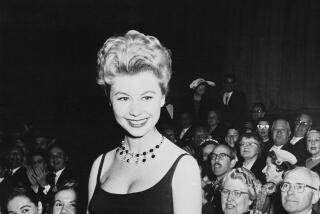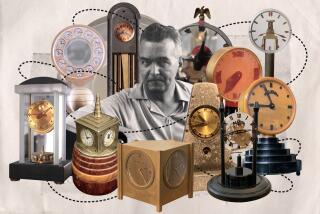From the Archives: June Allyson, 88; Film Sweetheart GIs Pined For
Actress June Allyson, the perky blond with the husky voice who was one of Hollywood’s most beloved stars in the 1940s and 1950s, has died. She was 88.
Allyson died Saturday at her home in Ojai of pulmonary respiratory failure and acute bronchitis after a long illness, her daughter, Pamela Powell, told The Times on Monday. David Ashrow, Allyson’s husband of 29 years, was at her side.
“She was a joy to know,” actress Ann Rutherford, who met Allyson at MGM in the 1940s, said Monday. “She was a wonderful actress and just confronted her life with vast enthusiasm.”
Aquatic film star Esther Williams, another MGM colleague, said: “Junie and I were wonderful friends. It was a wonderful relationship. Whenever we did a movie we’d trade scripts and talk about it and see if there was a way to make it more interesting. She was a very special little lady. Very strong; people didn’t know that.”
Allyson rose from teenage chorus girl on Broadway to contract player for MGM. She began in Hollywood as a dancer and singer in short films. She later co-starred with Jimmy Stewart, Humphrey Bogart, Van Johnson and Dick Powell in a series of wifely and other supportive roles. Powell became her real-life husband in 1945; he died in 1963.
Petite at barely 5 foot 1 and weighing less than 100 pounds, she was everybody’s sweetheart. As Ginger Rogers once said of her, “She’s the girl every man wants to marry and the girl every woman wants as a friend.”
Her simple, blond pageboy, Peter Pan collars and no-nonsense manner stamped her as the all-American girl next door, the woman millions of GIs wanted to come home to. She was consistently voted a top star by movie magazines and box office surveys.
Among her more well-known movies were her breakthrough film, “Two Girls and a Sailor,” in which she co-starred with Johnson and Gloria DeHaven; the 1949 remake of “Little Women,” playing the tomboy Jo; and three movies with Stewart: “The Stratton Story,” “The Glenn Miller Story” and “Strategic Air Command.”
After she married Powell and had two children, Allyson made a few films and TV movies and had her own TV show, an anthology series, from 1959 to 1961.
After his death, she continued working in films and appeared on Broadway, succeeding Julie Harris in “40 Carats.” She also appeared on many television programs, with guest spots on CBS’ “The Judy Garland Show” and roles in several series.
But life was not easy for Allyson after Powell’s death. Talking to CNN’s Larry King in 2001 about what she called her “tunnel years,” Allyson said, “I just locked myself away and – I found the bottle.”
She married and divorced Powell’s barber – twice. She said she felt her ties to the “good life” were unraveling.
She credited Ashrow, a dentist turned actor whom she married in 1976, with helping her to turn her life around.
Drinking and some relationship troubles hardly represented the good-girl image of Allyson that was fostered throughout her career both by her own sunny personality and the Hollywood publicity machine.
Although Allyson gave various birth dates for herself over the years, her daughter, in Santa Monica, said she was born Oct. 7, 1917. For 13 years, Allyson’s studio biography also stated that she was born “Jan Allyson” to French-English parents. But her daughter said Allyson was born Eleanor Geisman to a French mother and Dutch father.
Allyson wrote in her autobiography that a choreographer for “Sing Out the News,” her first Broadway show, decided she needed a new name, although she told CNN’s King that “actually, it was George Abbott,” the famed Broadway director.
She said Abbott liked the name June because it was “kind of sunny,” and she picked Allison, which was a family name, and changed the spelling slightly.
Once in Hollywood, the spunky Allyson was buoyed by her ability to form close friendships.
Among those who befriended her were Lucille Ball, who was the star of the 1943 film version of “Best Foot Forward,” and Mickey Rooney and Garland, who were the stars of “Girl Crazy,” in which Allyson had a specialty number.
Getting a foothold in Hollywood was not easy for Allyson, whom MGM movie chief Louis B. Mayer and others considered not conventionally beautiful. And although she got into films as a Broadway singer and dancer, Allyson was the first to say she was not particularly good at either.
It was Ball, who also starred in the 1944 film “Meet the People,” in which Allyson had a role, who counseled the discouraged Allyson not to give up on Hollywood.
“You’re here now, and you’re going to stay,” Ball said, according to Allyson’s autobiography.
Allyson’s next film was “Two Girls and a Sailor,” a musical that made her a star.
Eleanor Geisman was born in the Bronx into a rocky family situation. At age 8, she was seriously injured when a tree fell on her while she rode her bicycle. The cost of her medical care and physical therapy impoverished a family that was already desperate after the father had left.
“Sometimes my mother would not eat dinner when I was eating and I’d ask why,” Allyson wrote in her 1982 autobiography, written with Frances Spatz Leighton. “She would say she wasn’t hungry, but later I realized there was only enough food for one.” The two of them moved often, and sometimes young Ella was put in the care of her grandmother or another relative.
Eventually, Allyson could go without a cast and a brace. She wanted desperately to learn to dance and, unable to afford dance lessons, she picked it up by going to see Fred Astaire and Ginger Rogers movies.
When she boasted that she could dance as well as Rogers, her school friends dared her to try out for a Broadway musical comedy chorus line, and she got the part. She was still in seventh grade.
After several years in many chorus lines, Allyson graduated to small parts, including a bit she did with Ethel Merman in Cole Porter’s “Panama Hattie.” In that same musical, Allyson was understudy to Betty Hutton in the comic role of Florrie and, in a classic Broadway fantasy, Allyson stepped in for Hutton when the star got the measles.
Allyson’s performance caught the attention of Abbott, who needed someone like her to “ham up” scenes with Nancy Walker in “Best Foot Forward.” When the musical got picked up by MGM for a film, Allyson found herself a contract player in Hollywood.
She arrived in Los Angeles by train with $10 and knowing only two people there: Powell, whom she had met just once backstage on Broadway, and Johnson, whom she had dated in New York and who was making his way as an actor in Hollywood.
She and Johnson would later be cast together as a romantic couple in a number of films, including “Two Girls and a Sailor” (1944) and “The Bride Goes Wild” (1948). So tied were they in the public eye that movie fans “were panting for a marriage” between them, Allyson wrote. But they were always just friends.
When Allyson started out as a dancer in musicals, it was never without a bad case of nerves.
“I would dance and I would sing and I would throw up,” she wrote. “I learned not to eat much until the end of the day.”
But as an actress she had an appealing naturalness, and she had two valuable skills: She could memorize her lines almost instantly, and she could turn on the tears.
“They liked me because I was the only actress who not only cried on cue, I could also cry in key!” Allyson told The Times in 1968. “That’s very important in musicals.” She wrote that she would go somewhere quiet and repeat to herself, “I’m not going to cry,” and the tears would flow.
During the filming of “Meet the People,” which starred Powell, Allyson developed a crush on the actor. She had first met him in New York City when he asked to be introduced to her after a performance of “Best Foot Forward.”
Powell began advising her on her roles, telling her, for example, which of the two sisters she should play in “Two Girls and a Sailor.” When his marriage to actress Joan Blondell foundered, his attentions turned to Allyson. Blondell accused her of stealing her husband, which Allyson denied.
Allyson described her early years with Powell in fairy-tale terms, but in their 18 years together, there were some hard times. They separated once when Allyson fell in love with actor Alan Ladd, who was also married. Later, Allyson filed for divorce from Powell, who had been working nonstop running Four Star Productions, which produced many series for CBS. They reconciled about a year before he was diagnosed with cancer.
Allyson wrote in her autobiography that once, when Powell asked her what her philosophy of life was, she replied, “If you see someone without a smile, give him yours.”
“Richard almost fell off the chair laughing,” Allyson wrote of the moment. He exclaimed, “Oh, God, don’t let her change!”
In 1984, Allyson became the spokeswoman for Depend, a line of diaper products for adults with incontinence. The June Allyson Foundation, formed in 1997, raises money for incontinence research and education.
In addition to her husband and daughter, Allyson is survived by her son, Richard, of Reseda; a grandson in Van Nuys; and her brother, Arthur Peters of Ventura.
A private family memorial will be held, and an invitation-only celebration of Allyson’s life will be held on Oct. 7 in Ojai.
Times staff writer Dennis McLellan contributed to this report.
From the Archives: ‘America Lost a National Treasure’
From the Archives: Movie Great Ginger Rogers Dies at 83
From the Archives: Bette Davis Dies in Paris at 81
From the Archives: Nat ‘King’ Cole dies of cancer at 45
Mickey Rooney dies at 93; show-business career spanned a lifetime
More to Read
Start your day right
Sign up for Essential California for the L.A. Times biggest news, features and recommendations in your inbox six days a week.
You may occasionally receive promotional content from the Los Angeles Times.






